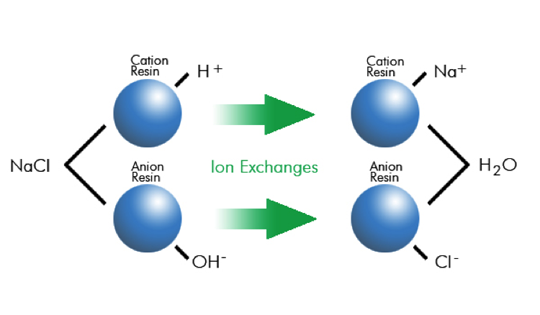Ion Exchange
What is Ion Exchange Technology?

Ion exchange is an exchange of ions between two electrolytes or between an electrolyte solution and a complex. In most cases the term is used to denote the processes of purification, separation, and decontamination of aqueous and other ion-containing solutions with solid polymeric or mineralic 'ion exchangers'.
Typical ion exchangers are ion exchange resins (functionalized porous or gel polymer), zeolites, montmorillonite, clay, and soil humus. Ion exchangers are either cation exchangers that exchange positively charged ions (cations) or anion exchangers that exchange negatively charged ions (anions). There are also amphoteric exchangers that are able to exchange both cations and anions simultaneously. However, the simultaneous exchange of cations and anions can be more efficiently performed in mixed beds that contain a mixture of anion and cation exchange resins, or passing the treated solution through several different ion exchange materials.
Ion exchangers can be unselective or have binding preferences for certain ions or classes of ions, depending on their chemical structure. This can be dependent on the size of the ions, their charge, or their structure. Typical examples of ions that can bind to ion exchangers are:
● H+ (proton) and OH− (hydroxide)● Single-charged monatomic ions like Na+, K+, and Cl−
● Double-charged monatomic ions like Ca2+ and Mg2+
● Polyatomic inorganic ions like SO42− and PO43−
● Organic bases, usually molecules containing the amine functional group -NR2H+
● Organic acids, often molecules containing -COO− (carboxylic acid) functional groups
● Biomolecules that can be ionized: amino acids, peptides, proteins, etc.
Along with absorption and adsorption, ion exchange is a form of sorption.
Ion exchange is a reversible process and the ion exchanger can be regenerated or loaded with desirable ions by washing with an excess of these ions
Applications
Ion exchange is widely used in the food & beverage, hydrometallurgical, metals finishing, chemical & petrochemical, pharmaceutical, sugar & sweeteners, ground & potable water, nuclear, softening & industrial water, semiconductor, power, and a host of other industries.
Most typical example of application is preparation of high purity water for power engineering, electronic and nuclear industries; i.e. polymeric or mineralic insoluble ion exchangers are widely used for water softening, water purification, water decontamination, etc.


